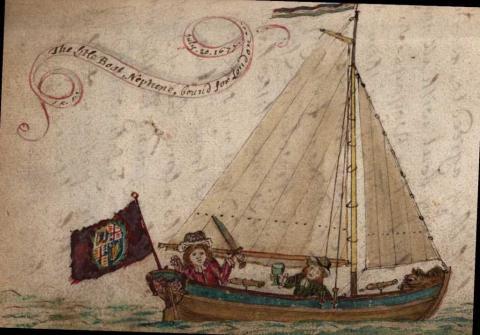27 Feb 2013
The journal records the details of a voyage from Plymouth to London and back again, performed in a little boat in the year 1677.
Roch served in Cromwell’s Navy in the Preston which was renamed the Antelope after the restoration of Charles II. He served as second commander to Sir F. Holles in the Henrietta and the Cambridge, leaving the Navy in 1667 but rejoined after the revolution in 1688. The only account available to us of his experiences between these dates is the journal herein mentioned. The account of his voyage in the tiny boat Neptune gives an interesting account of London at that time and tells of many things including his trading voyages in the Mary yacht from 1680 to 1684. After retirement from the Navy he became the captain of a merchant ship which unfortunately was captured by a French Privateer. His service record has survived within the Register of Sea Officers, Volume I of the Naval Manuscripts of the Pepysian Library at Magdalene College, Cambridge. In addition, a biographical reference can be obtained for him in John Charnock's Biographia navalis : or impartial memoirs of the lives and characters of officers of the Navy of Great Britain from the year 1660 to the present times (PBF2858/1-6)
The Journal

On reaching Cowes, they rest ashore in a feather bed to serve in giving Mr Roch’s bones some ease; actually he found his rest even more pleasant as ‘a jolly crew of French ladies, newly arrived in the next chamber, with music, dancing, and singing lulled [his] senses and sweetly closed [his] eyes.’ The next morning he is met with some ‘ugly faced shrugs’ from a Frenchman wanting passage to London. They take him in. During the voyage they endure a thunderstorm and wish to stay at Rye there ‘insides to wet and our outsides to dry’ but make the Frenchman stay in the boat! They actually had to wait until they reached Dover and the man and boy stay at the Cross Keys Inn.
Off Margate, they reach the flats and successfully steer through into the Channel when a large ship came through. There was hardly enough room for the boat to steer and they sailed so near to the sands which nearly scared poor Curtis out of his little wits! Finally they reach the Nore but experienced very rough seas, the narrator remarks ‘my poor Frenchman, who now looked but Poorly, to his beads, and Curtis turned up the whites of his eyes making an ugly face and dismal cries, but after a tough afternoon’s work’ they reach the Isle of Sheppey.
When the unlikely crew reach London, one of the crew of an East Indiaman at Blackwall shouts over to their boat and asks where they have come from. He does not believe, when Roch answers, that they have travelled from Plymouth to which Roch laughs and calls him an idle coxcomb. The purpose of the journey was to carry out his business in London and to meet family, friends and acquaintances. What struck me as interesting was the way Roch feels about his dog. He describes that he lost the dog when looking for a waterman to take care of his boat. He doesn’t seem to have any affection for his dog as he simply admits that he ‘ran clear out of sight and the noise was such that he could not hear me call him back.’ That is the end of their travels together. Thus far has concerned his journey there but not back again, which we have not time for here, but, is thoroughly enjoyable reading. Suffice it to say, Jeremy Roch returns to Plymouth in one piece after many adventures; although without his initial companions: his dog and boy.
'Thus ends a voyage none ever performed before,
In such boat to Coast Albions Shore!
From Plymouth to London and back again,
Is a great Wonder to the Sons of Men,
And may in future times be deem’d as strange,
As those with ships that Round the World did range.’
Mike Bevan, Archivist